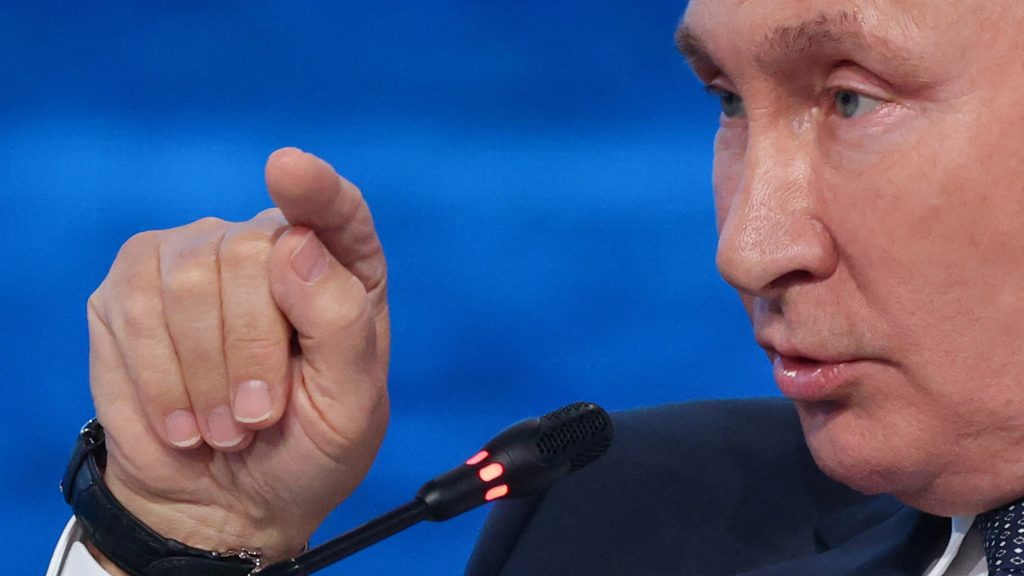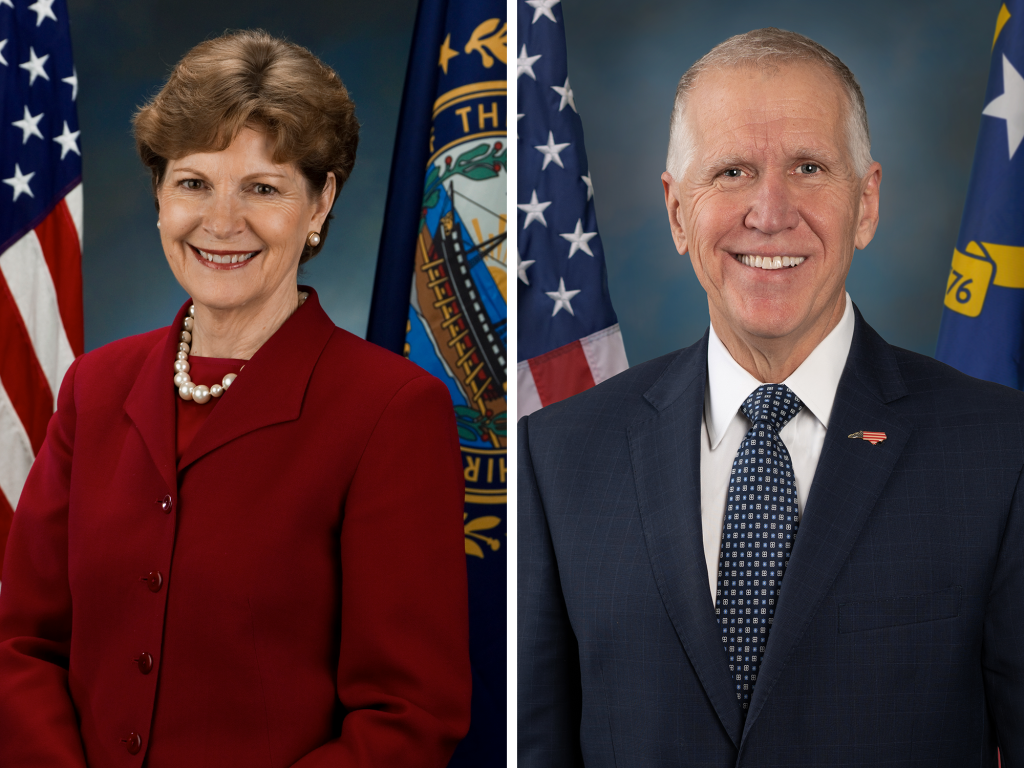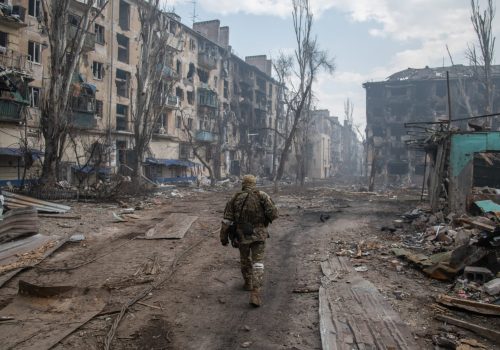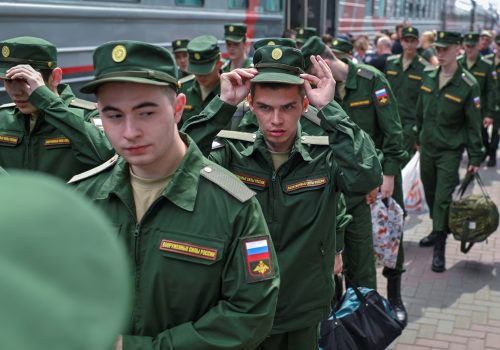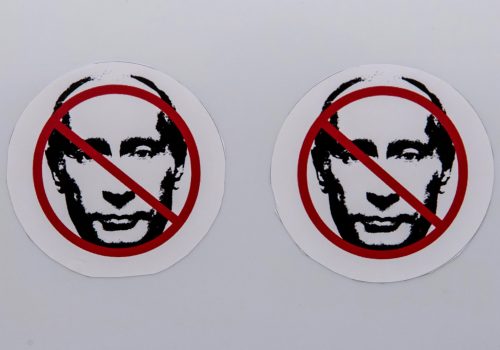Watch the full event
As Russian President Vladimir Putin launches a new phase in his war in Ukraine, attempting to mobilize three hundred thousand more troops and issuing new nuclear threats, Washington faces pivotal choices as well.
At an Atlantic Council Front Page event on Monday, following reports of the Biden administration’s back-channel warnings to the Kremlin about the consequences of nuclear weapons use, US Senator Jeanne Shaheen (D-NH) said it is “very important for the Biden administration to be very strong in the response that there would be significant reprisals for anything that Putin may do with respect to nuclear weapons.” US Senator Thom Tillis (R-NC) agreed, saying that in addition to toughening its economic sanctions and other measures against Russia, the United States will “have to be prepared to stand against the use of a tactical nuclear weapon.”
But the two senators—who have taken a leading role in Ukraine issues as co-chairs of the NATO Observer Group—are pushing US President Joe Biden to go much further in another area: Designating Russia as a state sponsor of terrorism alongside the likes of North Korea and Syria. While Biden has resisted such a move so far, Shaheen and Tillis said there’s substantial support across both the House and Senate to add Russia to the list.
Recalling scenes from Bucha and Izyum, where Ukraine uncovered torture rooms and mass graves after recapturing the cities, Shaheen said that it will be important to “hold Putin accountable for these war crimes. We can’t let him or any other leader do what he has done in Ukraine and have the world walk away without holding him accountable.”
Below are more highlights from the event, moderated by PBS NewsHour’s Nick Schifrin, where the senators called upon allies to boost their support for Ukraine not only for the country’s sovereignty but also for the region’s stability and for the sake of the international order.
Ramping up support
- Shaheen recalled meeting four women from the Ukrainian military who told her that they need Western weapons to fight Russia—and so that countries like the United States don’t have to. It will be critical to “make this offensive as strong as possible before the winter sets in,” Shaheen warned, “when we know it’s going to get much tougher.” Tillis agreed, saying that NATO members “need to make sure that we continue to provide the support… necessary for them to sustain” through winter.
- Both Shaheen and Tillis reiterated that it will be important for countries that have supported Ukraine to make the political case at home to maintain that support. “We just have to go back and remind people of the death and the despair that the Ukrainian people are experiencing because of a violation of international law on the part of one man,” said Tillis.
- The United States, however, hasn’t fulfilled Ukraine’s requests for Army Tactical Missile Systems which can launch missiles farther than other previously supplied systems. Tillis believes the Ukrainian army has demonstrated that “they’re good stewards of the resources that the United States or NATO partners and allies are providing them,” and therefore “anything we can do to help them secure the situation… needs to be on the table.” Shaheen argued that with these missile systems, there’s a need to “balance Ukraine’s needs with our own needs for defense” before providing them.
- Shaheen added that all of Ukraine’s allies and partners “need to try and do more,” to “ensure that we can provide the munitions long term that are being requested.” She also pointed to training as a “critical” way to prepare Ukraine for the conflict ahead: “Wars are not just won by weapons systems and munitions… they’re also won by strategy and by having men and women in the military who are trained.”
Securing Russia’s neighborhood
- In addition to keeping constituents willing to provide support, Tillis explained that the United States will have to explain to its allies and partners “that this is a real test” for the international order. “If Putin were successful in Ukraine, do we honestly think he will stop there? We know better… This is not about a once-and-done incursion in Ukraine,” Tillis warned.
- In July, Shaheen and US Senator Mitt Romney (R-UT) introduced a bill to establish a US strategy on the Black Sea region in response to Russia’s infringement on “the inability to get grain shipments out that are so critical to feeding so much of the world.” Moving forward, Shaheen warned that the United States will need to work “to ensure that we’re not in a position ten years, twenty years from now where Russia can blockade the Black Sea.”
Upholding the order
- This moment isn’t just a test of the international order in Russia’s neighborhood, according to Tillis: “If Russia succeeds here, what does that tell China in the South China Sea?” he asked. Shaheen agreed, noting that in this moment, “our adversaries are watching very carefully: China’s watching, Iran is watching, North Korea’s watching. There’s a lot riding on the outcome of this.”
- Tillis said that he hopes that China will come to understand that, with the West’s swift response to Russia’s invasion, “if they were to do something similar,” in Taiwan or elsewhere, “they should expect a similar response.”
- On Tuesday, Slovakia ratified Finland and Sweden’s accession into NATO. With Turkey and Hungary the last allies that have yet to ratify, Shaheen said it will be crucial to portray to them that it is in their interests to do so. “What Sweden and Finland bring to NATO is significant,” she said. Tillis agreed, adding that “with their Arctic capabilities, with their Baltic capabilities, with Sweden’s defense industrial base, [and] with Finland’s extraordinary military,” they will be crucial partners in a “very important” part of the world.
- The North Carolina Republican said he sometimes is questioned back home about why the United States is pouring so much into supporting a country that many Americans couldn’t find on a map. “Every time in history that we’ve only looked inward when we knew that there was a global threat, we have paid a price for it,” Tillis said he tells skeptical constituents. “We have an opportunity to avoid that by stopping Putin.”
Katherine Walla is an assistant director of editorial at the Atlantic Council.
Watch the full event
Further reading
Mon, Sep 26, 2022
Ukrainian priest recounts escape from Russian siege of Mariupol
UkraineAlert By Melinda Haring, Vladislav Davidzon
The Siege of Mariupol was the deadliest engagement so far in Russia's ongoing invasion of Ukraine. Ukrainian priest Father Pavel Kostel recounts his harrowing experience of escaping from the encircled city.
Fri, Sep 23, 2022
Russian War Report: Russia conducts partial mobilization amid battlefield losses
New Atlanticist By
As Ukraine's advances into its eastern territory put Russia under additional pressure, Putin declared a partial mobilization in the country.
Thu, Sep 22, 2022
Will Ukraine invasion condemn Putin to place among Russia’s worst rulers?
UkraineAlert By
Vladimir Putin has long dreamed of securing his place among the titans of Russian history but his disastrous Ukraine invasion now leaves him destined to be remembered as one of the country’s worst rulers.
Image: Russian President Vladimir Putin gestures during the plenary session of the 2022 Eastern Economic Forum (EEF) in Vladivostok, Russia on September 7, 2022. Photo via Sergey Bobylev/TASS Host Photo Agency via Reuters.
